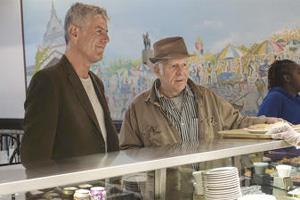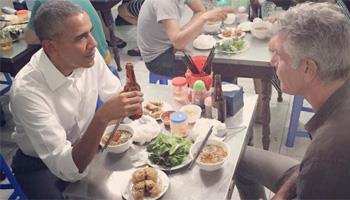Where’s the beef? Anthony Bourdain is about to tell you, this weekend, as Parts Unknown puts the finishing touch on its seventh season as one of CNN’s most reliable mainstays.
The beef is great, of course, but Bourdain has always pried beneath the surface and reached beyond the obvious of a travel ’n' cooking show. Parts Unknown is no more your average, typical, routine Travel Channel-type show than Paul Theroux is your routine, typical travel writer.
Like Theroux, Bourdain uses the act of travel — and the idea that the best way to get to know another culture is to break bread with the locals — as a springboard for a dizzying, clever and often revealing commentary on politics, social mores and the meaning of life.

There’s nothing precious or pretentious about it, either. Bourdain may dine with Barack Obama on occasion, as he did during the president’s recent state visit to Vietnam, but he’s an all-world neurotic, and unafraid to show it. Some of the best parts of Parts Unknown over the years have been his interior monologues — his 2015 Apocalypse Now-style return visit to the jungle waterways of Borneo, where he went upriver, Col. Kurtz-like, to get stinking drunk in a boozy, riverside flophouse and ruminate about a past relationship gone wrong; his 2014 segment on an expedition to Paraguay, where he learned his great grandpappy — one of them, anyway — rubbed shoulders with tin-pot dictators, war criminals on the lam and assorted jungle weirdoes; or the segment earlier this season where he hopscotched barefoot across the Greek Islands (above), looking for some much-needed peace and quiet and instead getting an earful from the locals about the Greek debt, the migrant refugee crisis, and how not paying your taxes is a perfectly legitimate way of registering your protest against a corrupt, incompetent government on the mainland. You want me to pay my taxes? Do something about the ferries, you mainland scum in a fancy suit. And don’t get me started on the European Union.
It’s that attitude — prickly, unpredictable, often irascible but almost always entertaining — that elevates Parts Unknown above your typical, run-of-the-mill travel series.
Leaving aside the stylish use of music, the crisp editing and often inspired photography — those funky camera angles, that slow-mo montage of roaches, bugs and all manner of insects on the grill, those sepia-toned stills of dodgy-looking distant relatives; take that, Ken Burns — Parts Unknown is a canny mix of substance and style. A 2013 show about Colombia took the cocaine cartels head-on, despite Bourdain’s admission that he wouldn’t make a very good narc, having been a frequent customer in a past life. The flight over the jungle in a rusty, groaning, storm-battered prop plane was like something out of Miami Vice during its Don Johnson heydays; it was easy to imagine the Eagles strumming their way through Smuggler’s Blues on the background soundtrack.
There’s a reason Parts Unknown airs on CNN and not the Travel Channel, or Food Network for that matter.
Bourdain will eat just about anything, provided he can know how it’s prepared. His consumption of alcohol verges on the frightening at times, if not physiologically impossible, and this is someone who readily admits — on-camera — that he’s fought a lifetime struggle against substance abuse.
It’s Bourdain’s offbeat and yet strangely perceptive way of viewing the world, though, that gives Parts Unknown the edge one might expect from a news program, rather than a rote travel documentary.
Just as Theroux wrote about imprisoned novelists dying from starvation and cold in the Soviet Gulags in his 2008 travel classic Ghost Train to the Eastern Star, Bourdain goes out of his way to talk to local, everyday people about their day-to-day lives, their regrets about the past and their hopes for the future, even if that means criticizing those in power. In a program earlier this season he travelled to the Caucasus nation of Georgia and its border with the breakaway region of South Ossetia — or, as the Russians call it, Russia — and gingerly stepped his way around a minefield, with a local guide full of stories about the 2008 war, not to be confused with the 2004 war, or the 1991-’92 war, and so on.
On second thought, perhaps it’s easy to see why he hits the bottle so hard. It’s hard to imagine Gordon Ramsay tiptoeing his way through a minefield without throwing a tantrum — bad idea, that — or Jamie Oliver sitting down with a genuine, real-life executioner and finding common ground for a light conversation.
I haven’t seen this weekend’s season finale of Parts Unknown. I imagine Bourdain will talk about the beef, about the parrillas steakhouses, the thick-cut chips and red wines topped up with soda water, about how Buenos Aires is also known for its pizza joints, Latin fusion restaurants and seafood palaces, and the world-renowned eateries with names like La Brigada, La Lechuza, La Cabrera and Lo de Jesus.

If Parts Unknown stays the course, however, Bourdain will also likely open the occasional can of worms and ask people’s opinions about the fallout from the country’s flirtation with neo-Keynesian economic policies, the recent presidency of Cristina Fernández de Kirchner and whether the current president, Mauricio Macri, has what it takes to keep the reactionaries at bay, despite his liberal views on such issues as indigenous people’s rights and gay marriage, and his stated vows that he will abide by any ruling or law sanctioned by Argentina’s courts, regardless of his personal views. A loser, in other words, if we’re to believe a certain present candidate for president of the U.S.
There’ll still be room for rest and recreation, though. Bourdain is slated to attend an Argentinian soccer match at some point during the program. This is not for the faint of heart. It’s not like taking in an NBA final game, or even an NFL playoff game. Theroux wrote about going to see a Latin American match in person, in his early travel classic The Old Patagonian Express.
Theroux says he’s never forgotten the experience — in part because he was almost killed.
To Bourdain’s mind, that would be a hell of a way to end the season.